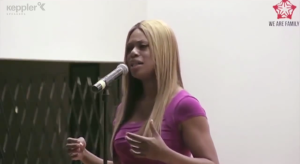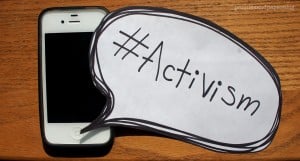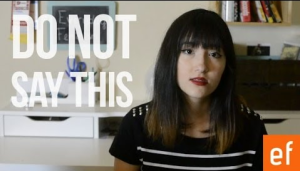Hi y’all. This is another video in a series that I’m doing with Everyday Feminism, which is a website dedicated to helping you stand up to and break down everyday oppression. In this video, I would like to talk about one way that racism shows up in everyday interactions that we have.
Racism is not always going to be straight forward and apparent, like racial slurs or conscious bigotry or hatred. It’s an ideology so deeply ingrained in our society that we can’t possibly know all the ways that it affects how we move through the world and interact with people from different racial backgrounds.
One of the ways that racism shows up in these interactions is as a dismissal of people of color’s reality. I’d like to look at this manifestation of racism through a philosophical lens.
The philosopher Miranda Fricker describes a kind of injustice that she calls “testimonial injustice.” I thought that this sort of applied, so I wanted to bring it into the conversation. Basically, it’s the idea that someone can be wronged, specifically in their capacity as a knower. In simpler terms, the testimony or the spoken reality of members of some stigmatized group, like people of color in a society that favors white people, is taken less seriously than it ought to be because the stigma makes it easy to dismiss them.
The social group that a person belongs to will often have a dramatic effect on society’s willingness to treat them like a credible source of knowledge. This might come in the form of failing to listen properly to the contribution of a person of color, or judging their contribution to be less compelling or less original than it actually is.
These are things that we can do without being aware that we’re actually doing them. How this happens is largely unconscious, but it is a form of injustice, so we as white people need to be more cautious with the way that we respond to the testimony and reality of people of color in order to minimize our own implicit biases that we probably have in us.
One example is very new. The 14-year-old Ahmed Mohamed is a student who was arrested for bringing a clock that he built to school. School administrators mistook the clock for a bomb, or some kind of bomb, I guess, and despite this child continuously telling teachers and eventually the police that it was a clock, he wasn’t believed.
They had him arrested, he was detained, he was questioned without an attorney present. The police spokesman told the news, “We attempted to question the juvenile about what it was and he would simply only tell us that it was a clock.” Hm, he would simply only tell them it was a clock.
Because of who Ahmed is, what he looks like, what his name is, his family’s religion, his testimony was just not good enough for the police. He was not only not believed, but because they didn’t get the answer that they were looking for the question was not even considered answered. They were like, “We attempted to question him.” Okay, well, you questioned him and he answered, so he’s been questioned.
The stereotypes associated with Ahmed’s appearance and religion altered not only the way that his own teachers perceived him, but the value that they actually place on his words, because he’s been saying all along, “It’s just a clock,” and they didn’t believe him.
This is an example of the dismissal of testimony of a stigmatized person. It shows society’s unwillingness to treat Ahmed, and other people of color like him, as credible sources. Really, it’s a 14-year-old kid. They had no reason not to trust what he was saying. But, he was judged as untrustworthy from the get go and his testimony was ignored as a result of that.
Another example of this is the Nicki Minaj/Miley Cyrus “feud” in the news, which is actually just an instance of a woman of color, Nicki, calling out blatant racism on the part of Miley Cyrus and white people in the media are largely dismissing Nicki as an angry black woman and this just like a celebrity feud.
Saying, “Oh, there’s no real racism here. Miley hasn’t done anything wrong” is just another instance, another denial by white people of the presence of racism when people of color are explicitly saying, Nicki’s saying, “Yes, this is wrong. This is racist.” Why aren’t we listening to her?
Miley Cyrus has co-opted pieces of black culture over and over that suit her image, but she doesn’t really care about black issues and she’s made that pretty clear by not speaking up on anything. This whole situation perpetuates the appropriation of black culture.
It once again frames people of color, like Nicki, who speak up about it as angry black people, which is another harmful stereotype, which ultimately feeds right back into the way that we as a society don’t value what people of color are saying and what they’re saying is their reality.
It’s sort of a self perpetuating cycle and it needs to be broken. It can only really happen if we commit ourselves, as white people, to changing our own habits and stop accepting and making excuses for people like Miley, who are doing this publicly and without repercussions. I mean, she has tons of people coming to support her.
This happens in the mainstream media all the time. But, it also happens in our face to face everyday encounters between white people and people of color. I thought I would just list a few ways on how to avoid committing this kind of testimonial injustice in conversations about race that you might be having.
Firstly, white people don’t bare the social burden of race, so we don’t have to think about it all the time in order to move through society. We can sort of forget about our racial identity and it doesn’t really come up as much. When people of color bring up race, it’s easy for white people to dismiss it, like “Oh, that’s irrelevant here. You’re playing the race card.” Or, “Oh, that’s a personal issue, not a race thing.”
But, this is really to dismiss their reality as a racialized person, whose race is always present and relevant to them. Instead, correct yourself. Think, just because this is not an issue of race for me, it does not mean it’s not a racial issue for someone else.
Secondly, when people of color tell you that something you did or said had some kind of racist impact, your instinct will be to deny the plausibility, like “Oh, I didn’t mean it like that. I had good intentions. It couldn’t possibly be racist.” But, being uncomfortable with confronting your own internal racism is not a good reason to deny the experience of that person of color.
They experienced your action or what you said as racist or having racist implications, so tolerate the discomfort you feel with being told that and learn how to do better. It’s as simple as that.
Third, question what the media tells you about people of color. Instead, you should be attempting to understand the reality of racism by listening to people of color and believing them and being open to uncovering and unlearning your own socialized racism.
The bottom line here is to stop dismissing the perspectives of people of color, just because you’re unfamiliar with the complexities of race. Which is fair. As white people, we aren’t forced to learn about these things in the way that people of color are, just to survive and move through society. We need to actively commit ourselves to doing that.
Back to the philosopher. Miranda Fricker argues that by underrating the testimonies of others, due to the wrongful stereotyping that is attached to them, that’s committing an injustice. It’s a form of racial injustice that happens all the time. Prejudice can corrupt our judgement of some speakers credibility, without us being aware that we’re being prejudiced there. It’s a unique kind of injustice, which is just one of the many negative effects of racial stereotypes that are still present in society.
It requires white people to question our own beliefs about the credibility of others, confront our own discomfort with discussions about race and become more aware of the implicit biases that we might be holding without knowing.
If you’re interested in learning what kind of implicit biases there are and what you might hold, you can actually take a test that Harvard has put out. It’s call the Implicit Association Test. You can Google it. You can take it. Make sure that you choose the country that you’re most familiar with.
I’m living in the UK, but I would choose Canada to do the test because it makes it more accurate. You can find what sort of biases you hold and once you know about them, it’s easier to learn how to counter them in everyday situations.
I hope that this was helpful. I tried to cram it all in. I look forward to your comments. I’ll see you next time.




















